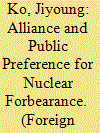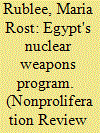| Srl | Item |
| 1 |
ID:
168592


|
|
|
|
|
| Summary/Abstract |
How does a patron state dampen a client state's domestic aspirations for developing nuclear weapons? What nonproliferation tools most effectively induce a client state's domestic preference for nuclear forbearance? This article assesses the relative effectiveness of three nonproliferation tools available to a nuclear patron: a declaration of extended deterrence, forward deployment of nuclear weapons, and a conditional threat of punishment. More specifically, using experimental data on the South Korean public, this article examines whether nuclear forward-deployment and a conditional threat of punishment are more effective than a declaratory policy in enhancing the credibility of extended deterrence and curbing public aspirations for nuclearization. The experimental results show that neither nuclear forward-deployment nor a conditional threat of punishment reduces public support for nuclear armament significantly more than a declaratory policy. They also reveal that compared to when a nuclear ally does not exist, the three nonproliferation tools do not necessarily dampen the public's preference for developing indigenous nuclear weapons. The robustness of the findings is assessed using an experiment on a small sample of government officials. Taken together, this study provides the first experimental evidence on public perception of different nonproliferation tools in a client state.
|
|
|
|
|
|
|
|
|
|
|
|
|
|
|
|
| 2 |
ID:
076717


|
|
|
|
|
| Publication |
2006.
|
| Summary/Abstract |
The Egyptian nuclear weapons program - started in 1960 and closed by 1973 - can lend insights into today's potential proliferators. First, a number of signs indicating that Cairo was pursing a nuclear option were present, giving us insight into what type of signs we might see from countries seeking nuclear weapons today. While indicators do not necessarily connote intent, my research shows that in the Egyptian case, these signs were indeed warnings that Cairo was seeking a military nuclear capability. Second, a number of external and internal factors combined to shut down the nuclear program, and fortunately, some of these external factors are still applicable today, giving us potential tools to use in persuading other states to forgo nuclear weapons.
|
|
|
|
|
|
|
|
|
|
|
|
|
|
|
|